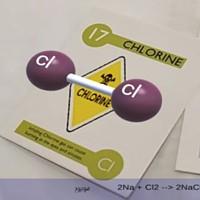A Study on Female Students’ Attitude Towards the Use of Augmented Reality to Learn Atoms and Molecules Reactions in Palestinian Schools

The chemical reaction between different molecules is an important learning subject in a chemistry course. Especially for elementary school students, this can be an abstract concept and therefore difficult to understand. One way to facilitate this learning process is to use Augmented Reality (AR) technology, which is considered as an added value compared to classical learning materials such as textbooks, 2D images, video, etc. Among the different advantages of using AR technology in the context of educational domain is the fact that 3D technology is offering a safe environment especially if the students have to perform critical tasks such as simulating chemical reactions. This work investigates the students’ attitude towards the use of a mobile AR application for learning atoms and molecules reactions. In particular, we focused on female students as in general female students show less interest in science and technology than male students. We were keen to investigate whether the use of AR technology could change this attitude. The students are able to interact with the different AR components to explore the possible reactions in a 3D interface, to see the structure and shape of atoms and molecules, and to view related descriptions in their native language, i.e. the Arabic language. The mobile AR application was evaluated by a class of 12–13 years old (7th grade) students in a Palestinian primary school. The number of participants was 50, all female students. After analyzing the results, we can conclude that the female students had a positive attitude toward the use of this AR application in their learning process.
Publication Reference
Ewais, A. & De Troyer, O., A Study on Female Students’ Attitude Towards the Use of Augmented Reality to Learn Atoms and Molecules Reactions in Palestinian Schools. International Conference on Augmented Reality, Virtual Reality and Computer Graphics: AVR 2019, LNCS 11614. De Paolis, L. T. & Bourdot, P. (eds.). Springer Nature Switzerland AG, p. 295-309

